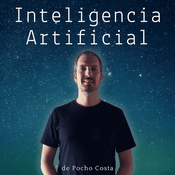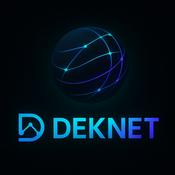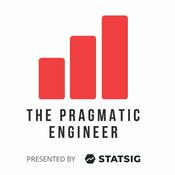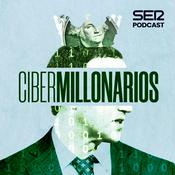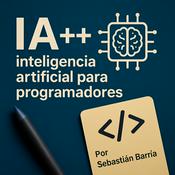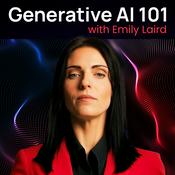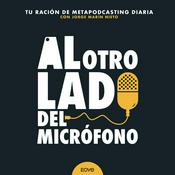247 episodios
- What if life itself is just a really sophisticated computer program that wrote itself into existence?
Blaise Agüera y Arcas presenting at ALife 2025 — the most technically detailed public walkthrough of the ideas in his *What is Life?* and *What is Intelligence?* books that we've come across.He covers the BFF experiments (self-replicating programs emerging spontaneously from random noise), the mathematical framework connecting Lotka-Volterra population dynamics with Smoluchowski coagulation, eigenvalue analysis of cooperation matrices, and his central claim that symbiogenesis — not mutation — is the primary engine of evolutionary novelty.The experimental results are genuinely striking: complex self-replicating code arising from random byte strings with zero mutation, a sharp phase transition that looks like gelation, and a proof that blocking deep symbiogenetic ancestry trees prevents the transition entirely.A few things worth flagging for critical viewers:— The substrate is more carefully engineered than the framing sometimes suggests. The choice of language, tape length, interaction protocol, and step limits all shape what emerges. Their own SUBLEQ counterexample (where self-replicators *don't* arise despite being theoretically possible) highlights that these design choices matter substantially — and a general theory of which substrates support this transition is still missing.— The leap from "self-replicating programs on fixed-length tapes" to "life was computational and intelligent from the start" involves significant philosophical extrapolation beyond what the experiments directly demonstrate.— The Bedau et al. (2000) open problems paper he references at the start actually sets a higher bar for Challenge 3.2 than BFF currently meets: it asks that "the internal organization of these 'organisms' and the boundaries separating them from their environment arise and be sustained through the activities of lower-level primitives" — whereas BFF's tape boundaries are fixed by design, not emergent.
---
TIMESTAMPS:
00:00:00 Introduction: From Noise to Programs & ALife History
00:03:15 Defining Life: Function as the "Spirit"
00:05:45 Von Neumann's Insight: Life is Embodied Computation
00:09:15 Physics of Computation: Irreversibility & Fallacies
00:15:00 The BFF Experiment: Spontaneous Generation of Code
00:23:45 The Mystery: Complexity Growth Without Mutation
00:27:00 Symbiogenesis: The Engine of Novelty
00:33:15 Mathematical Proof: Blocking Symbiosis Stops Life
00:40:15 Evolutionary Implications: It's Symbiogenesis All The Way Down
00:44:30 Intelligence as Modeling Others
00:46:49 Q&A: Levels of Abstraction & Definitions
---
REFERENCES:
Paper:
[00:01:16] Open Problems in Artificial Life
https://direct.mit.edu/artl/article/6/4/363/2354/Open-Problems-in-Artificial-Life
[00:09:30] When does a physical system compute?
https://arxiv.org/abs/1309.7979
[00:15:00] Computational Life
https://arxiv.org/abs/2406.19108
[00:27:30] On the Origin of Mitosing Cells
https://pubmed.ncbi.nlm.nih.gov/11541392/
[00:42:00] The Major Evolutionary Transitions
https://www.nature.com/articles/374227a0
[00:44:00] The ARC gene
https://www.nih.gov/news-events/news-releases/memory-gene-goes-viral
Person:
[00:05:45] Alan Turing
https://plato.stanford.edu/entries/turing/
[00:07:30] John von Neumann
https://en.wikipedia.org/wiki/John_von_Neumann
[00:11:15] Hector Zenil
https://hectorzenil.net/
[00:12:00] Robert Sapolsky
https://profiles.stanford.edu/robert-sapolsky
---
LINKS:
RESCRIPT: https://app.rescript.info/public/share/ff7gb6HpezOR3DF-gr9-rCoMFzzEgUjLQK6voV5XVWY - What makes something truly *intelligent?* Is a rock an agent? Could a perfect simulation of your brain actually *be* you? In this fascinating conversation, Dr. Jeff Beck takes us on a journey through the philosophical and technical foundations of agency, intelligence, and the future of AI.
Jeff doesn't hold back on the big questions. He argues that from a purely mathematical perspective, there's no structural difference between an agent and a rock – both execute policies that map inputs to outputs. The real distinction lies in *sophistication* – how complex are the internal computations? Does the system engage in planning and counterfactual reasoning, or is it just a lookup table that happens to give the right answers?
*Key topics explored in this conversation:*
*The Black Box Problem of Agency* – How can we tell if something is truly planning versus just executing a pre-computed response? Jeff explains why this question is nearly impossible to answer from the outside, and why the best we can do is ask which model gives us the simplest explanation.
*Energy-Based Models Explained* – A masterclass on how EBMs differ from standard neural networks. The key insight: traditional networks only optimize weights, while energy-based models optimize *both* weights and internal states – a subtle but profound distinction that connects to Bayesian inference.
*Why Your Brain Might Have Evolved from Your Nose* – One of the most surprising moments in the conversation. Jeff proposes that the complex, non-smooth nature of olfactory space may have driven the evolution of our associative cortex and planning abilities.
*The JEPA Revolution* – A deep dive into Yann LeCun's Joint Embedding Prediction Architecture and why learning in latent space (rather than predicting every pixel) might be the key to more robust AI representations.
*AI Safety Without Skynet Fears* – Jeff takes a refreshingly grounded stance on AI risk. He's less worried about rogue superintelligences and more concerned about humans becoming "reward function selectors" – couch potatoes who just approve or reject AI outputs. His proposed solution? Use inverse reinforcement learning to derive AI goals from observed human behavior, then make *small* perturbations rather than naive commands like "end world hunger."
Whether you're interested in the philosophy of mind, the technical details of modern machine learning, or just want to understand what makes intelligence *tick,* this conversation delivers insights you won't find anywhere else.
---
TIMESTAMPS:
00:00:00 Geometric Deep Learning & Physical Symmetries
00:00:56 Defining Agency: From Rocks to Planning
00:05:25 The Black Box Problem & Counterfactuals
00:08:45 Simulated Agency vs. Physical Reality
00:12:55 Energy-Based Models & Test-Time Training
00:17:30 Bayesian Inference & Free Energy
00:20:07 JEPA, Latent Space, & Non-Contrastive Learning
00:27:07 Evolution of Intelligence & Modular Brains
00:34:00 Scientific Discovery & Automated Experimentation
00:38:04 AI Safety, Enfeeblement & The Future of Work
---
REFERENCES:
Concept:
[00:00:58] Free Energy Principle (FEP)
https://en.wikipedia.org/wiki/Free_energy_principle
[00:06:00] Monte Carlo Tree Search
https://en.wikipedia.org/wiki/Monte_Carlo_tree_search
Book:
[00:09:00] The Intentional Stance
https://mitpress.mit.edu/9780262540537/the-intentional-stance/
Paper:
[00:13:00] A Tutorial on Energy-Based Learning (LeCun 2006)
http://yann.lecun.com/exdb/publis/pdf/lecun-06.pdf
[00:15:00] Auto-Encoding Variational Bayes (VAE)
https://arxiv.org/abs/1312.6114
[00:20:15] JEPA (Joint Embedding Prediction Architecture)
https://openreview.net/forum?id=BZ5a1r-kVsf
[00:22:30] The Wake-Sleep Algorithm
https://www.cs.toronto.edu/~hinton/absps/ws.pdf
<trunc, see rescript>
---
RESCRIPT:
https://app.rescript.info/public/share/DJlSbJ_Qx080q315tWaqMWn3PixCQsOcM4Kf1IW9_Eo
PDF:
https://app.rescript.info/api/public/sessions/0efec296b9b6e905/pdf - Professor Mazviita Chirimuuta joins us for a fascinating deep dive into the philosophy of neuroscience and what it really means to understand the mind.*What can neuroscience actually tell us about how the mind works?* In this thought-provoking conversation, we explore the hidden assumptions behind computational theories of the brain, the limits of scientific abstraction, and why the question of machine consciousness might be more complicated than AI researchers assume.Mazviita, author of *The Brain Abstracted,* brings a unique perspective shaped by her background in both neuroscience research and philosophy. She challenges us to think critically about the metaphors we use to understand cognition — from the reflex theory of the late 19th century to today's dominant view of the brain as a computer.*Key topics explored:**The problem of oversimplification* — Why scientific models necessarily leave things out, and how this can sometimes lead entire fields astray. The cautionary tale of reflex theory shows how elegant explanations can blind us to biological complexity.*Is the brain really a computer?* — Mazviita unpacks the philosophical assumptions behind computational neuroscience and asks: if we can model anything computationally, what makes brains special? The answer might challenge everything you thought you knew about AI.*Haptic realism* — A fresh way of thinking about scientific knowledge that emphasizes interaction over passive observation. Knowledge isn't about reading the "source code of the universe" — it's something we actively construct through engagement with the world.*Why embodiment matters for understanding* — Can a disembodied language model truly understand? Mazviita makes a compelling case that human cognition is deeply entangled with our sensory-motor engagement and biological existence in ways that can't simply be abstracted away.*Technology and human finitude* — Drawing on Heidegger, we discuss how the dream of transcending our physical limitations through technology might reflect a fundamental misunderstanding of what it means to be a knower.This conversation is essential viewing for anyone interested in AI, consciousness, philosophy of mind, or the future of cognitive science. Whether you're skeptical of strong AI claims or a true believer in machine consciousness, Mazviita's careful philosophical analysis will give you new tools for thinking through these profound questions.---TIMESTAMPS:00:00:00 The Problem of Generalizing Neuroscience00:02:51 Abstraction vs. Idealization: The "Kaleidoscope"00:05:39 Platonism in AI: Discovering or Inventing Patterns?00:09:42 When Simplification Fails: The Reflex Theory00:12:23 Behaviorism and the "Black Box" Trap00:14:20 Haptic Realism: Knowledge Through Interaction00:20:23 Is Nature Protean? The Myth of Converging Truth00:23:23 The Computational Theory of Mind: A Useful Fiction?00:27:25 Biological Constraints: Why Brains Aren't Just Neural Nets00:31:01 Agency, Distal Causes, and Dennett's Stances00:37:13 Searle's Challenge: Causal Powers and Understanding00:41:58 Heidegger's Warning & The Experiment on Children---REFERENCES:Book:[00:01:28] The Brain Abstractedhttps://mitpress.mit.edu/9780262548045/the-brain-abstracted/[00:11:05] The Integrated Action of the Nervous Systemhttps://www.amazon.sg/integrative-action-nervous-system/dp/9354179029[00:18:15] The Quest for Certainty (Dewey)https://www.amazon.com/Quest-Certainty-Relation-Knowledge-Lectures/dp/0399501916[00:19:45] Realism for Realistic People (Chang)https://www.cambridge.org/core/books/realism-for-realistic-people/ACC93A7F03B15AA4D6F3A466E3FC5AB7<truncated, see ReScript>---RESCRIPT:https://app.rescript.info/public/share/A6cZ1TY35p8ORMmYCWNBI0no9ChU3-Kx7dPXGJURvZ0PDF Transcript:https://app.rescript.info/api/public/sessions/0fb7767e066cf712/pdf
- What if everything we think we know about the brain is just a really good metaphor that we forgot was a metaphor?This episode takes you on a journey through the history of scientific simplification, from a young Karl Friston watching wood lice in his garden to the bold claims that your mind is literally software running on biological hardware.We bring together some of the most brilliant minds we've interviewed — Professor Mazviita Chirimuuta, Francois Chollet, Joscha Bach, Professor Luciano Floridi, Professor Noam Chomsky, Nobel laureate John Jumper, and more — to wrestle with a deceptively simple question: *When scientists simplify reality to study it, what gets captured and what gets lost?**Key ideas explored:**The Spherical Cow Problem* — Science requires simplification. We're limited creatures trying to understand systems far more complex than our working memory can hold. But when does a useful model become a dangerous illusion?*The Kaleidoscope Hypothesis* — Francois Chollet's beautiful idea that beneath all the apparent chaos of reality lies simple, repeating patterns — like bits of colored glass in a kaleidoscope creating infinite complexity. Is this profound truth or Platonic wishful thinking?*Is Software Really Spirit?* — Joscha Bach makes the provocative claim that software is literally spirit, not metaphorically. We push back on this, asking whether the "sameness" we see across different computers running the same program exists in nature or only in our descriptions.*The Cultural Illusion of AGI* — Why does artificial general intelligence seem so inevitable to people in Silicon Valley? Professor Chirimuuta suggests we might be caught in a "cultural historical illusion" — our mechanistic assumptions about minds making AI seem like destiny when it might just be a bet.*Prediction vs. Understanding* — Nobel Prize winner John Jumper: AI can predict and control, but understanding requires a human in the loop. Throughout history, we've described the brain as hydraulic pumps, telegraph networks, telephone switchboards, and now computers. Each metaphor felt obviously true at the time. This episode asks: what will we think was naive about our current assumptions in fifty years?Featuring insights from *The Brain Abstracted* by Mazviita Chirimuuta — possibly the most influential book on how we think about thinking in 2025.---TIMESTAMPS:00:00:00 The Wood Louse & The Spherical Cow00:02:04 The Necessity of Abstraction00:04:42 Simplicius vs. Ignorantio: The Boxing Match00:06:39 The Kaleidoscope Hypothesis00:08:40 Is the Mind Software?00:13:15 Critique of Causal Patterns00:14:40 Temperature is Not a Thing00:18:24 The Ship of Theseus & Ontology00:23:45 Metaphors Hardening into Reality00:25:41 The Illusion of AGI Inevitability00:27:45 Prediction vs. Understanding00:32:00 Climbing the Mountain vs. The Helicopter00:34:53 Haptic Realism & The Limits of Knowledge---REFERENCES:Person:[00:00:00] Karl Friston (UCL)https://profiles.ucl.ac.uk/1236-karl-friston[00:06:30] Francois Chollethttps://fchollet.com/[00:14:41] Cesar Hidalgo, MLST interview.https://www.youtube.com/watch?v=vzpFOJRteeI[00:30:30] Terence Tao's Bloghttps://terrytao.wordpress.com/Book:[00:02:25] The Brain Abstractedhttps://mitpress.mit.edu/9780262548045/the-brain-abstracted/[00:06:00] On Learned Ignorancehttps://www.amazon.com/Nicholas-Cusa-learned-ignorance-translation/dp/0938060236[00:24:15] Science and the Modern Worldhttps://amazon.com/dp/0684836394<truncated, see ReScript>
RESCRIPT:https://app.rescript.info/public/share/CYy0ex2M2kvcVRdMnSUky5O7H7hB7v2u_nVhoUiuKD4PDF Transcript: https://app.rescript.info/api/public/sessions/6c44c41e1e0fa6dd/pdf
Thank you to Dr. Maxwell Ramstead for early script work on this show (Ph.D student of Friston) and the woodlice story came from him! - Dr. Jeff Beck, mathematician turned computational neuroscientist, joins us for a fascinating deep dive into why the future of AI might look less like ChatGPT and more like your own brain.
**SPONSOR MESSAGES START**
—
Prolific - Quality data. From real people. For faster breakthroughs.
https://www.prolific.com/?utm_source=mlst
—
**END**
*What if the key to building truly intelligent machines isn't bigger models, but smarter ones?*
In this conversation, Jeff makes a compelling case that we've been building AI backwards. While the tech industry races to scale up transformers and language models, Jeff argues we're missing something fundamental: the brain doesn't work like a giant prediction engine. It works like a scientist, constantly testing hypotheses about a world made of *objects* that interact through *forces* — not pixels and tokens.
*The Bayesian Brain* — Jeff explains how your brain is essentially running the scientific method on autopilot. When you combine what you see with what you hear, you're doing optimal Bayesian inference without even knowing it. This isn't just philosophy — it's backed by decades of behavioral experiments showing humans are surprisingly efficient at handling uncertainty.
*AutoGrad Changed Everything* — Forget transformers for a moment. Jeff argues the real hero of the AI boom was automatic differentiation, which turned AI from a math problem into an engineering problem. But in the process, we lost sight of what actually makes intelligence work.
*The Cat in the Warehouse Problem* — Here's where it gets practical. Imagine a warehouse robot that's never seen a cat. Current AI would either crash or make something up. Jeff's approach? Build models that *know what they don't know*, can phone a friend to download new object models on the fly, and keep learning continuously. It's like giving robots the ability to say "wait, what IS that?" instead of confidently being wrong.
*Why Language is a Terrible Model for Thought* — In a provocative twist, Jeff argues that grounding AI in language (like we do with LLMs) is fundamentally misguided. Self-report is the least reliable data in psychology — people routinely explain their own behavior incorrectly. We should be grounding AI in physics, not words.
*The Future is Lots of Little Models* — Instead of one massive neural network, Jeff envisions AI systems built like video game engines: thousands of small, modular object models that can be combined, swapped, and updated independently. It's more efficient, more flexible, and much closer to how we actually think.
Rescript: https://app.rescript.info/public/share/D-b494t8DIV-KRGYONJghvg-aelMmxSDjKthjGdYqsE
---
TIMESTAMPS:
00:00:00 Introduction & The Bayesian Brain
00:01:25 Bayesian Inference & Information Processing
00:05:17 The Brain Metaphor: From Levers to Computers
00:10:13 Micro vs. Macro Causation & Instrumentalism
00:16:59 The Active Inference Community & AutoGrad
00:22:54 Object-Centered Models & The Grounding Problem
00:35:50 Scaling Bayesian Inference & Architecture Design
00:48:05 The Cat in the Warehouse: Solving Generalization
00:58:17 Alignment via Belief Exchange
01:05:24 Deception, Emergence & Cellular Automata
---
REFERENCES:
Paper:
[00:00:24] Zoubin Ghahramani (Google DeepMind)
https://pmc.ncbi.nlm.nih.gov/articles/PMC3538441/pdf/rsta201
[00:19:20] Mamba: Linear-Time Sequence Modeling
https://arxiv.org/abs/2312.00752
[00:27:36] xLSTM: Extended Long Short-Term Memory
https://arxiv.org/abs/2405.04517
[00:41:12] 3D Gaussian Splatting
https://repo-sam.inria.fr/fungraph/3d-gaussian-splatting/
[01:07:09] Lenia: Biology of Artificial Life
https://arxiv.org/abs/1812.05433
[01:08:20] Growing Neural Cellular Automata
https://distill.pub/2020/growing-ca/
[01:14:05] DreamCoder
https://arxiv.org/abs/2006.08381
[01:14:58] The Genomic Bottleneck
https://www.nature.com/articles/s41467-019-11786-6
Person:
[00:16:42] Karl Friston (UCL)
https://www.youtube.com/watch?v=PNYWi996Beg
Más podcasts de Tecnología
Podcasts a la moda de Tecnología
Acerca de Machine Learning Street Talk (MLST)
Welcome! We engage in fascinating discussions with pre-eminent figures in the AI field. Our flagship show covers current affairs in AI, cognitive science, neuroscience and philosophy of mind with in-depth analysis. Our approach is unrivalled in terms of scope and rigour – we believe in intellectual diversity in AI, and we touch on all of the main ideas in the field with the hype surgically removed. MLST is run by Tim Scarfe, Ph.D (https://www.linkedin.com/in/ecsquizor/) and features regular appearances from MIT Doctor of Philosophy Keith Duggar (https://www.linkedin.com/in/dr-keith-duggar/).
Sitio web del podcastEscucha Machine Learning Street Talk (MLST), Applelianos y muchos más podcasts de todo el mundo con la aplicación de radio.es
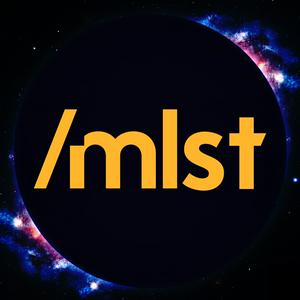
Descarga la app gratuita: radio.es
- Añadir radios y podcasts a favoritos
- Transmisión por Wi-Fi y Bluetooth
- Carplay & Android Auto compatible
- Muchas otras funciones de la app
Descarga la app gratuita: radio.es
- Añadir radios y podcasts a favoritos
- Transmisión por Wi-Fi y Bluetooth
- Carplay & Android Auto compatible
- Muchas otras funciones de la app


Machine Learning Street Talk (MLST)
Escanea el código,
Descarga la app,
Escucha.
Descarga la app,
Escucha.




